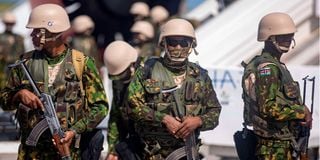
Kenyan police officers in Port-au-Prince, Haiti on June 25, 2024.
The mandate of an international police mission in Haiti led by Kenyan police officers expires next month, but negotiations are underway with the United Nations Security Council to extend it for another year.
On October 2, 2023, the UN Security Council authorised the deployment of a Multinational Security Support Mission led by Kenya for an initial period of 12 months, with a review after nine months.
However, delays by countries pledging troops hampered the mission's ability to help Haiti's police to restore order in areas overrun by gangs and to secure key government facilities.
Kenya sent police officers eight months after the UN approved the mission, and Jamaica only sent a small contingent last week.
The first contingent of Kenyan police officers, drawn from the General Service Unit (GSU), special units and the Border Patrol Unit (BPU), was deployed in June 2024. The second group left weeks later, bringing the number of Kenyan officers in Haiti to 400. Mr Godfrey Otunge is the commander of the mission and his deputy is Colonel Kevron Henry of Jamaica.
On Monday, the Kenyan Ministry of Foreign Affairs confirmed that the mission is scheduled to end next month.
“Peace keeping resolutions like the one Kenya is leading in Haiti are usually granted a one-year term but it is renewable. Negotiations to extend that for another one year are ongoing,” Foreign Affairs Principal Secretary Korir Sing'oei told Nation.Africa.
According to the PS, if the extension is granted, the mission will run until October 2025.
He said the main reason for the mission was to ensure that Haiti was peaceful and that elections could be held.
Last Thursday, 20 Jamaican soldiers arrived in Haiti as part of the peacekeeping mission.
Other countries that have pledged to send soldiers to Haiti include the Bahamas, Bangladesh, Barbados, Benin and Chad. The total number of officers from these countries is expected to be 2,500.
The officers will be deployed in phases at a cost of $600 million (about Sh77 billion) a year. So far the UN has $85 million in pledges for the mission, out of which $68 million has been received.
The US and Canada have provided most of the money so far. Peacekeeping operations, on the other hand, are funded from a special UN budget.
In 2022, former Haitian Prime Minister Ariel Henry called for an international force to combat gangs.
In response, UN Secretary-General António Guterres spent months appealing to countries willing to help restore peace in Haiti. In response, Kenya pledged to send 1,000 police officers.
The Kenyan team has been battling the gangs for weeks and recently Jimmy Cherizier, alias Barbecue, the most feared gang leader in Haiti, complained that they were ruthless.
Kenyan officers who spoke to the Nation said they had carried out a series of raids.
“We have reclaimed a hospital which was being run by the gang members and also in more areas the gangs have been wiped out,” said an officer who spoke on condition of anonymity as he is not authorised to speak to the media.
US Secretary of State Antony Blinken assured the officers this week that necessary resources would be made available.
“We want to make sure that the mission has the resources that it needs to do the job as effectively as possible. And so we’re looking at additional personnel contributions,” he said.
He added it was critical to ensure the officers get their salaries on time.
“We have some money in the bank to do that, including through the United Nations (UN) fund that’s been established. But as we’re projecting out and as we’re looking at growing the MSS mission itself, we also have to figure out what’s going to be required to pay for that, and I think we’re going to need more funding to do that,” Blinken said.
“That’s exactly why I’m bringing together colleagues at the UN General Assembly on the margins of that, just to make sure that we are properly resourcing it.”
Kenyan police officers have received armoured personnel carrier (APC) vehicles for the mission.
An APC is a broad type of armoured military vehicle designed to transport personnel and equipment in combat zones.
Between January and May, 600,000 people were internally displaced in Haiti due to gang activity. The gangs are trying to control most parts of the country.







